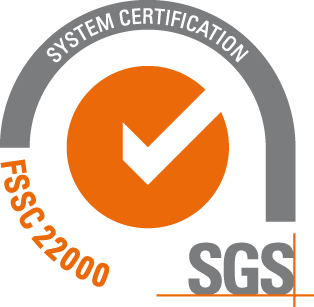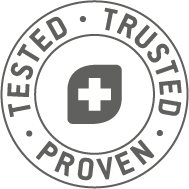The immune system is essential for humans. It protects the body from pathogens such as viruses or bacteria that can cause illness. Once the pathogens have entered the body, the immune system is responsible for fighting it in various ways.
A strong immune defence helps you to stay fit, efficient and disease-resistant. But how can we support our immune system? First of all: Our diet has a very decisive influence on it. In the following we have collected some important recommendations.
1. Sufficient proteins and micronutrients
Make sure you eat a balanced, varied diet with lots of vegetables and fruit. This ensures a nutrient-dense supply of vital micronutrients. In addition, a sufficient supply of protein is also crucial, as an optimal protein metabolism is not only important for building and maintaining muscle mass, but also for many other functions (e.g. antibodies, blood cells, enzymes, hormones, immune system).
Strong defences depend not only on protein, vitamins and minerals, but also on a healthy intestinal microflora. In addition, there are a number of other nutrients which, due to their specific properties, provide a broad spectrum of effects and thus contribute to wellbeing, an active and vital lifestyle.
Tip: Make sure to take approx. 25 g protein every 3-4 hours. If these cannot be sufficiently covered by the normal diet (e.g. in the afternoon), protein supplements (protein bars, protein shakes) are a convenient and high-quality alternative.
2. Sun and vitamin D
Vitamin D plays an important role for the immune system and the body’s own defences. It is mainly formed in the skin by sun radiation. A deficiency of vitamin D is therefore particularly prevalent during the winter months. Vitamin D deficiency is very common, especially in countries with fewer hours of sunshine, such as north of the Alps, and is further favoured by a predominantly indoor lifestyle and possibly excessive sun protection means. In Switzerland, around 50% of the total population, with a higher proportion of older people, has a vitamin D deficiency.
Vitamin D is the only vitamin that can be produced by the body itself. When sunlight (excluding UVB radiation) strikes the skin, vitamin D is produced in the skin unless sunscreen is applied, which almost completely prevents its formation. The time of day with the highest proportion of UVB radiation is at midday, but this is also when the intensity of the sun is at its highest and the risk of sunburn is greatest. So how can we proceed to have enough vitamin D?
- Short exposure to the sun: already about 15-20 minutes in the midday sun are sufficient to fill the vitamin D stores. During this time, the body’s own protection against harmful sunburn is usually sufficient.
- Intake of vitamin D via food supplements. This is a simple way of supplying the body with vitamin D in case of strong sun protection measures.
3. Sport And Exercise
Sport influences our health and the immune system in many ways. Exercise has a positive effect on body and mind, and thus contributes to health, for example through the increased release of “happiness” hormones. Sport also has a direct effect on our immune system. Activating the circulation not only improves physical fitness and general well-being, but also trains and prepares the immune system and its various mechanisms. Sport also reduces stress. This has a positive effect on sleep quality, which is also an important pillar of a strong immune system.
Whether running, cycling, long walks or indoor training. Do what you enjoy! Already short and moderate exercise of 20 minutes is effective in many ways,
Moderate load: Note that training that is too demanding can also have a negative impact. If the immune system is already working at full speed, hard workouts are not recommended. Therefore, it is important that you do not exercise if you have an infection! In this case, the body needs rest and additional stress only slows down recovery.
TIP: Exercise daily in a moderate way and in the form that you enjoy most. No matter if you need support for your endurance units, muscle building or body shaping, you will find the right support here thanks to the helpful filters.
4. Reduced Stress & Good Mood
Constant stress makes you sick! It has a negative effect on the immune system, causes increased levels of stress hormones and thus significantly weakens the body.
For humans, stress and the released stress hormones (mainly adrenaline & cortisol) make sense from an evolutionary point of view as a short-term reaction of the body to an exceptional situation, such as escape or fight. Here they ensure the release of additional energy reserves of the body, which helps us to survive by increasing physical performance. The only difference is that a high stress hormone level is not intended to be a permanent state.
Countless studies have already dealt with the effects of stress on our immune system (psycho-neuro-immunology). The result has always been the same: with permanent stress the total number of immune cells in the blood as well as their activity decreases, resulting in a weakened immune defence. As a result, we become ill earlier and more often because viruses, bacteria and germs find less resistance. A healthy intestinal flora as an important barrier against pathogenic germs is also crucial in this context, so that these cannot easily penetrate into the blood.
For a healthy intestinal flora, nutrition is of central importance. A diet rich in sugar increases the stress hormone level (cortisol), whereas a diet rich in dietary fibres (salad, vegetables) has a prebiotic effect and promotes a healthy intestinal flora. Fermented foods (sauerkraut, yoghurt, cheese, etc.) also have a positive effect due to the probiotic bacteria they contain.
Tip: Wherever possible, try to eliminate stressful circumstances and consciously plan relax time. Sport helps one person, music, a walk or meditation helps another. No matter what it is, find out what works and feels best for you, and use it! Eat a varied and healthy diet, rich in fibre, and avoid sugary foods.
5. Sufficient sleep
The better our sleep, the more effective our immune system works!
Good sleep supports our immune system. Sleep deprivation, on the other hand, causes our defence cells, which identify and kill infected cells, to function less effectively. Less antibodies are produced. However, these are essential in the fight against pathogens (viruses, bacteria, etc.) and therefore a prerequisite for staying healthy and, if possible, not getting sick in the first hand.
A lack of sleep also has an indirect effect on our immune system, as stress hormones can no longer be broken down equally well (see tip 4). Nowadays, lack of sleep is one of the main causes of stress, with far-reaching consequences!
Both sleep quantity and quality are crucial. Most research suggests that 7 to 9 hours is ideal for the majority of people. Many people seem to find it increasingly difficult to get deep and good sleep. Good sleep hygiene can help. For example: regular times to get up and sleep, no big late meals, sleeping environment (light, temperature, noise, oxygen supply). On the other hand, alcohol and smoking have a negative effect on sleep quality. Caffeine should be avoided as far as possible in the last hours before going to bed, as should the display of the smartphone because of its blue light component.
Besides good sleep hygiene, regular physical activity (see tip 3) has a positive effect on your sleep as well. It is recommended to do calming things in the evening to fall asleep more quickly.
TIP: Additionally, support your hormonal and regenerative processes during sleep with a “night protein”. This is slowly digested and ensures a continuous influx of amino acids into your bloodstream.









